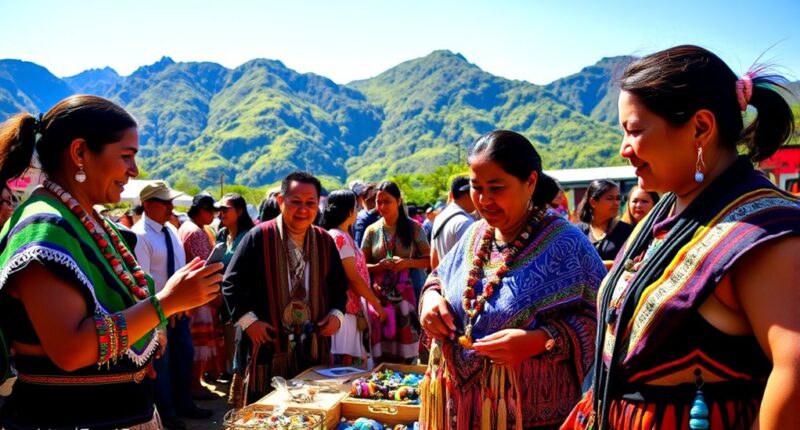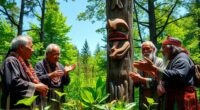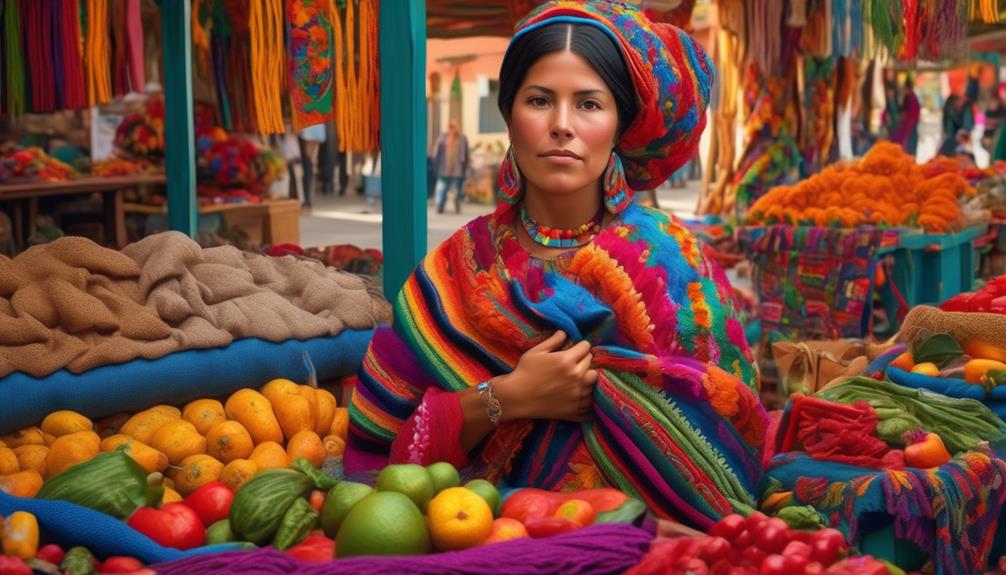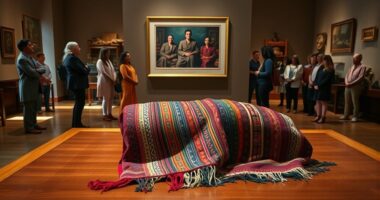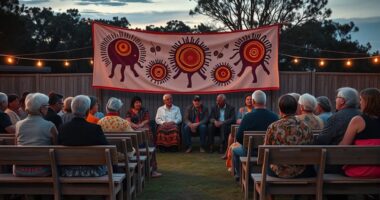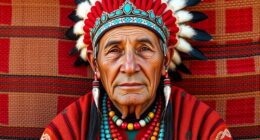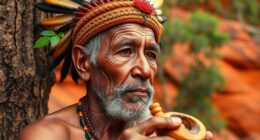Indigenous-owned tourism offers you a chance to experience authentic culture while supporting communities’ economic growth and cultural preservation. By choosing these options, you help empower Indigenous voices, promote responsible travel, and foster genuine connections. This approach also combats stereotypes and guarantees your travel dollars make a positive impact. If you keep exploring, you’ll discover how these initiatives create meaningful, sustainable experiences for both visitors and communities alike.
Key Takeaways
- Indigenous-owned tourism preserves cultural heritage by showcasing authentic traditions, stories, and crafts on communities’ own terms.
- It empowers Indigenous communities economically through direct support of local businesses and reinvestment into community development.
- Responsible Indigenous tourism emphasizes respect for sovereignty, cultural rights, and fosters genuine interactions between travelers and communities.
- Choosing Indigenous-owned options enhances authenticity, promotes sustainability, and helps combat stereotypes and cultural misappropriation.
- Travelers benefit from unique cultural experiences while supporting community resilience and ensuring positive social and economic impacts.
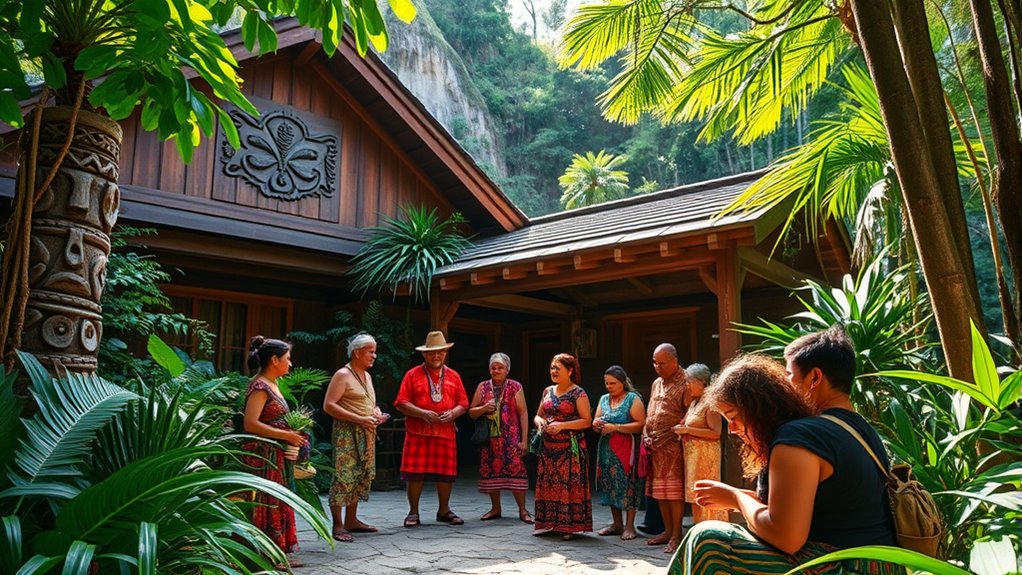
Have you ever wondered how travel can support Indigenous communities while offering authentic experiences? When you choose Indigenous-owned tourism, you’re participating in more than just sightseeing—you’re helping to preserve cultures and boost local economies. Indigenous communities often face threats to their traditions and identities, especially as global tourism expands. By engaging with Indigenous-owned businesses, you directly contribute to cultural preservation, ensuring that unique languages, crafts, stories, and rituals are kept alive for future generations. These communities see tourism as a way to showcase their heritage on their own terms, rather than having it commercialized or appropriated. Your travel choices can help sustain their cultural practices and reassert their ownership over their narratives.
Beyond cultural preservation, Indigenous-owned tourism also offers significant opportunities for economic empowerment. When you book tours, stay in Indigenous-run accommodations, or purchase handcrafted items directly from community members, your spending goes straight into local hands. This financial support can help communities develop their infrastructure, fund education, and improve healthcare—transforming tourism from a fleeting experience into a lasting benefit. Unlike large international corporations, Indigenous entrepreneurs often reinvest in their communities, creating jobs and fostering self-sufficiency. Your commitment to responsible travel can shift the economic landscape, giving Indigenous communities more control over their resources and future. Additionally, understanding the legislative changes related to cultural property rights can enhance your ability to support authentic initiatives.
Choosing Indigenous-owned tourism isn’t just about the destination; it’s about the intent behind your journey. It’s about respecting the community’s sovereignty and supporting their right to share their culture on their own terms. When you participate ethically, you foster genuine connections, learn more deeply about Indigenous traditions, and help combat stereotypes or misconceptions. It’s essential to approach your travels with sensitivity, listening to community voices and respecting their guidelines for visitors. Engaging directly with Indigenous-owned businesses also encourages greater transparency and accountability, ensuring your dollars are making a positive impact.
In essence, Indigenous-owned tourism offers a meaningful way to travel that benefits both you and the community. You get to experience authentic cultural expressions, while also contributing to their preservation and economic growth. It’s a mutually enriching exchange—where respect and responsibility create lasting value. By making conscious travel choices and prioritizing Indigenous-owned options, you help foster sustainable and ethical tourism. Your journey becomes more than just a trip; it becomes a catalyst for positive change, empowering Indigenous communities to thrive and share their rich heritage with pride.
Frequently Asked Questions
How Do Indigenous Communities Fund Tourism Development Projects?
You can support indigenous communities’ tourism projects through sustainable financing and community investment. They often access government grants, private funding, and partnerships that prioritize ethical development. Crowdfunding and social enterprise models also play a role, enabling communities to raise funds directly from supporters. These methods guarantee the projects are community-driven, sustainable, and respectful of cultural values, fostering economic growth while preserving their heritage.
What Measures Ensure the Authenticity of Indigenous Cultural Experiences?
Think of cultural authenticity as a delicate thread woven into every experience. You can guarantee it by involving Indigenous communities directly in designing tours, which guarantees experience validation. Respectful storytelling and adherence to traditional practices also preserve authenticity. Regular monitoring, feedback from community members, and transparent communication further safeguard genuine cultural experiences. By doing so, you help keep the essence alive, like a vibrant tapestry rich with history and tradition.
How Is Profit Shared Within Indigenous-Owned Tourism Ventures?
In indigenous-owned tourism ventures, profit distribution is typically transparent, with a significant portion reinvested into the community to support local projects and infrastructure. You’ll find that community benefits are prioritized, ensuring that profits help sustain cultural preservation, education, and social programs. This equitable approach empowers the community, fosters trust, and guarantees that economic gains directly support indigenous peoples’ well-being and long-term development.
What Training Is Provided to Indigenous Guides and Staff?
You receive extensive training that emphasizes cultural immersion and skill development, ensuring guides and staff are well-prepared. This includes learning about local traditions, storytelling, and sustainable practices to authentically share indigenous heritage. The training also covers essential customer service skills and safety protocols, empowering staff to deliver meaningful and respectful experiences. By focusing on these areas, indigenous guides become confident ambassadors of their culture and environment.
How Do Indigenous-Led Tourism Initiatives Impact Local Ecosystems?
Indigenous-led tourism initiatives positively impact local ecosystems by promoting eco tourism benefits and fostering cultural preservation. You’ll find that these initiatives emphasize sustainable practices, reducing environmental harm while highlighting indigenous traditions. By showcasing their culture and environment responsibly, they help protect ecosystems and support community well-being. This approach encourages visitors to appreciate nature respectfully, ensuring the preservation of both natural landscapes and indigenous heritage for future generations.
Conclusion
By supporting indigenous-owned tourism, you’re not just exploring new destinations—you’re helping preserve cultures and empower communities. Evidence shows that when travelers choose these authentic experiences, it boosts local economies and promotes sustainable practices. This isn’t just a theory; it’s a proven way to make travel more ethical and meaningful. So, next time you plan a trip, consider how your choices can create positive change and respect indigenous traditions. Your journey can truly make a difference.
